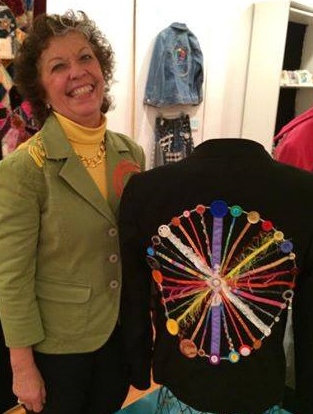Remembering Columbine – healing trauma for creative sensitive gifted people. Nineteen years ago this Friday, April 20, 1999, my husband Gary and I connected for a rare lunch together.  As we munched on our sandwiches under a restaurant patio umbrella, we saw police car after police car roaring south through Lakewood on Wadsworth Blvd, sirens wailing . Chills went up and down my spine as we also heard the rumble of big military type helicopters overhead. We saw that they were all heading for Columbine-our new neighborhood, where we had lived for only six weeks. We knew something BIG and BAD was happening. Later that day we, along with everyone else, were horrified as we learned about the terrible tragedy at Columbine High School. This is a time of remembrance, for Columbine, and for many other schools who have suffered such tragedies. This is a time of healing the wounds created by such suffering and trauma.
As we munched on our sandwiches under a restaurant patio umbrella, we saw police car after police car roaring south through Lakewood on Wadsworth Blvd, sirens wailing . Chills went up and down my spine as we also heard the rumble of big military type helicopters overhead. We saw that they were all heading for Columbine-our new neighborhood, where we had lived for only six weeks. We knew something BIG and BAD was happening. Later that day we, along with everyone else, were horrified as we learned about the terrible tragedy at Columbine High School. This is a time of remembrance, for Columbine, and for many other schools who have suffered such tragedies. This is a time of healing the wounds created by such suffering and trauma.
When you’re personally involved in any life-threatening event, you experience Direct Trauma. Vicarious traumatization can occur when you hear someone talk about it, you read about it or see it on TV.
If you’re highly sensitive, creative, and/or gifted, you experience both direct and vicarious traumatization more quickly, more easily, more deeply and more pervasively than do other people.
So what can a creative, sensitive or gifted person do to minimize the effects of trauma, and to heal from it?
According to (my limited understanding of ) quantum physics, chaos theory and string theory, everything in the universe including your body, is both matter and energy. In this context, minimizing the effects of trauma and healing from it come at least partially from how you direct or channel the flow of energy within the matter of your body. But in this culture, you likely have learned to stop the flow of your feelings, both body sensations and emotions. Maybe you’ve been told, “Don’t be angry. Don’t be sad. Don’t be afraid. Don’t cry. Don’t yell. Don’t, don’t, don’t.” If so, before long, you can’t. And you may not be aware that you’re stifling your normal, healthy responses, and hindering the flow of energy in your body.
 Instead, you could benefit from accepting, feeling your feelings, and allowing or even helping them to flow through you. Feelings are a lot like ocean waves. Ocean waves come and go without your permission. Feelings come and go-also without your permission. Waves are always there, whether you like them or not. Feelings are also always there, like it or not. Waves respond to the magnetic pull of the moon, the weather, and events around you. Feelings respond to invisible forces of nature, and to events within and outside of you.
Instead, you could benefit from accepting, feeling your feelings, and allowing or even helping them to flow through you. Feelings are a lot like ocean waves. Ocean waves come and go without your permission. Feelings come and go-also without your permission. Waves are always there, whether you like them or not. Feelings are also always there, like it or not. Waves respond to the magnetic pull of the moon, the weather, and events around you. Feelings respond to invisible forces of nature, and to events within and outside of you.
If there’s an earthquake on the floor of the ocean, it can cause a tsunami wave on the other side of the earth. If there’s an earthquake in your life, that can release a tsunami size flood of feeling within you. It may help you to know that these ‘abnormal’ feelings are normal in response to your abnormal circumstances.
Remembering Columbine; healing trauma for creative sensitive gifted people
Here’s four things you can DO that will help you as a creative, sensitive, gifted person facilitate the flow of feelings within you:
- Breathe. When humans (and many other creatures also) are stressed, we breathe less. W
 e hold our breath, or breathe shallow breaths. So the simplest thing is often to just breathe. Breathe deeply. Breathe fully. Breathe the breath down into our bellies. Breathe the breath down into our toes, and through our feet into the ground or the floor. Slow our breathing down, slower, slower and still slower. The more impatient you get reading these repetitions, the more likely it is that you need to breathe deeply, and to slow your own breathing, now. And keep slowing it down more and more.
e hold our breath, or breathe shallow breaths. So the simplest thing is often to just breathe. Breathe deeply. Breathe fully. Breathe the breath down into our bellies. Breathe the breath down into our toes, and through our feet into the ground or the floor. Slow our breathing down, slower, slower and still slower. The more impatient you get reading these repetitions, the more likely it is that you need to breathe deeply, and to slow your own breathing, now. And keep slowing it down more and more. - Talk it. Talking about what has happened, what you saw, what you heard, what you felt
 and are still feeling is critical. Talk about it with everyone who will listen. This is why support groups are so valuable. People come together who have experienced similar things, and who therefore understand each other at least to some extent. You each help each other to heal as you each have an opportunity to tell your stories and to listen to each other. Remembering shared past traumas can be important, as it builds hope that you again can heal, grow and recover from hard times, like you have done in the past.
and are still feeling is critical. Talk about it with everyone who will listen. This is why support groups are so valuable. People come together who have experienced similar things, and who therefore understand each other at least to some extent. You each help each other to heal as you each have an opportunity to tell your stories and to listen to each other. Remembering shared past traumas can be important, as it builds hope that you again can heal, grow and recover from hard times, like you have done in the past.  Walk it. Trauma triggers the flight-or-fight response in the body, which releases a flood of biochemicals into our blood stream. These need to be used up; exercise is a great way to do this. In addition, it’s important to find natural ways to switch the body into the Relaxation Response, rather than relying completely on things like drugs and alcohol. Progressive relaxation, deep breathing, yoga, tai chi, chi gong, muscle stretching exercises, prayer and medication are some healthy ways to promote the Relaxation Response.
Walk it. Trauma triggers the flight-or-fight response in the body, which releases a flood of biochemicals into our blood stream. These need to be used up; exercise is a great way to do this. In addition, it’s important to find natural ways to switch the body into the Relaxation Response, rather than relying completely on things like drugs and alcohol. Progressive relaxation, deep breathing, yoga, tai chi, chi gong, muscle stretching exercises, prayer and medication are some healthy ways to promote the Relaxation Response. Chalk it. Get creative, Make something with your creative hands hands that represents your traumatic experience. This brings the process out of your head and into your body. Making something that shows what you are feeling, physically and emotionally also pulls the physical and emotional feelings through and out of your body and into the object you are making. This facilitates the flow of energy in your body and in your life and promotes body-mind-soul-spirit healing.
Chalk it. Get creative, Make something with your creative hands hands that represents your traumatic experience. This brings the process out of your head and into your body. Making something that shows what you are feeling, physically and emotionally also pulls the physical and emotional feelings through and out of your body and into the object you are making. This facilitates the flow of energy in your body and in your life and promotes body-mind-soul-spirit healing.
This is somewhat like opening a floodgate at the side of a dam, releasing water in a controlled manner. This keeps an uncontrolled flood of water from overflowing the dam or demolishing it, which would then destroy everything downstream from it. Releasing small amounts of emotion frequently in a structured, controlled way can also prevent huge uncontrolled floods from occurring.
One key to minimizing trauma and healing from trauma is to remember this:
In abnormal circumstances, abnormal feelings are normal.
 It’s OK to feel whatever you are feeling. It’s normal to have a Trauma Response following a Trauma Exposure, whether the trauma is personal or vicarious. It is normal for creative, sensitive and/or gifted people to have more of a Trauma Response to a given Trauma Exposure than neurotypical people would have. So feel whatever it is that you feel, and then release it. Do this as much and as often as you need to. Get moving physically. Express it verbally and creatively. Get professional help if or when these aren’t enough. You’ll soon be on your way to recovery.
It’s OK to feel whatever you are feeling. It’s normal to have a Trauma Response following a Trauma Exposure, whether the trauma is personal or vicarious. It is normal for creative, sensitive and/or gifted people to have more of a Trauma Response to a given Trauma Exposure than neurotypical people would have. So feel whatever it is that you feel, and then release it. Do this as much and as often as you need to. Get moving physically. Express it verbally and creatively. Get professional help if or when these aren’t enough. You’ll soon be on your way to recovery.
My full article, “Tips for Helping Gifted Kids and Teens Cope With Trauma,” is published in the SENGifted.org online Newsletter, now called the SENG Vine. To read it, click here.
If you want still more info about healing from trauma, you can scroll to the bottom of this page and follow the links to some of my other posts about healing trauma. You can also click on the Webinars Menu item above; on that list there’s a recorded webinar on healing trauma for creative, sensitive and gifted people.

